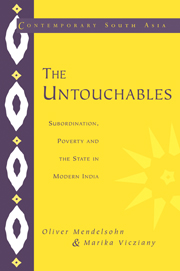Book contents
- Frontmatter
- Contents
- List of tables
- Glossary
- Preface
- 1 Who are the Untouchables?
- 2 The question of the ‘Harijan atrocity’
- 3 Religion, politics and the Untouchables from the nineteenth century to 1956
- 4 Public policy I: adverse discrimination and compensatory discrimination
- 5 Public policy II: the anti-poverty programs
- 6 The new Untouchable proletariat: a case study of the Faridabad stone quarries
- 7 Untouchable politics and Untouchable politicians since 1956
- 8 The question of reservation: the lives and careers of some Scheduled Caste MPs and MLAs
- 9 Subordination, poverty and the state in modern India
- Bibliography
- Index
5 - Public policy II: the anti-poverty programs
Published online by Cambridge University Press: 05 June 2012
- Frontmatter
- Contents
- List of tables
- Glossary
- Preface
- 1 Who are the Untouchables?
- 2 The question of the ‘Harijan atrocity’
- 3 Religion, politics and the Untouchables from the nineteenth century to 1956
- 4 Public policy I: adverse discrimination and compensatory discrimination
- 5 Public policy II: the anti-poverty programs
- 6 The new Untouchable proletariat: a case study of the Faridabad stone quarries
- 7 Untouchable politics and Untouchable politicians since 1956
- 8 The question of reservation: the lives and careers of some Scheduled Caste MPs and MLAs
- 9 Subordination, poverty and the state in modern India
- Bibliography
- Index
Summary
Our consistent argument is that the condition of the Untouchables can only be adequately conceived by reference to two interlocking forms of subordination: ritual, cultural and broader social debasement on the one hand, and poverty on the other. This chapter examines thinking and programs directed specifically to the economic condition of the poor, among whom the Untouchables represent a large chunk. Our preoccupation is with the failure of measures that might have led to markedly less poverty than there is in India today, but we also consider the relative successes. We examine health and food policy, and the meaning of the phrase that ‘India can now feed itself’ the relative absence of modern social welfare; the implications of the failure to pursue land redistribution more vigorously; the inability of the Indian state to deliver fully on anything other than crisis management; and the weaknesses of the anti-poverty programs that were eventually introduced in the 1980s. We look at how different States have dealt with poverty, and how Untouchables have fared in these varying circumstances. Finally, we consider the question of the overall progress of the Untouchables.
The post-Independence regime has failed to bring about a systematic redistribution of resources in favour of those at the bottom of society, and it has also failed to pursue a consistent, albeit non-radical, strategy of supplying ‘basic needs’ (health, education and simple welfare) to the poor. Supplying basic needs would not have transformed the condition of the Untouchables – the evidence from Kerala tends to prove this – but it would have made a powerful difference.
- Type
- Chapter
- Information
- The UntouchablesSubordination, Poverty and the State in Modern India, pp. 147 - 175Publisher: Cambridge University PressPrint publication year: 1998
- 1
- Cited by



